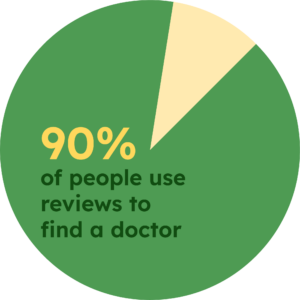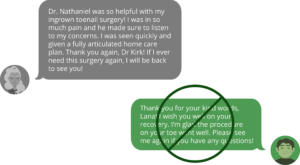Responding to online reviews in today’s digital environment isn’t optional — it’s a must, especially in healthcare. Patients expect to find information about healthcare providers online and want to share feedback about their experiences.
On the other hand, actively engaging with patients through online reviews is a crucial aspect of your reputation management. It demonstrates that you value your patients’ opinions and are willing to take steps to continually improve the care you provide.
 In this process, negative patient reviews are inevitable, especially when dealing with people who are in pain, feeling sick, or just having a bad day. When this happens, don’t shy away from negative feedback or ignore it because patients need to know that their concerns are being heard and addressed promptly. Reviews are often the first step in a patient’s journey to find a new healthcare provider, and 90% of people searching for a doctor use reviews as part of their decision-making process.
In this process, negative patient reviews are inevitable, especially when dealing with people who are in pain, feeling sick, or just having a bad day. When this happens, don’t shy away from negative feedback or ignore it because patients need to know that their concerns are being heard and addressed promptly. Reviews are often the first step in a patient’s journey to find a new healthcare provider, and 90% of people searching for a doctor use reviews as part of their decision-making process.
Also, while it may be tempting to only focus on positive reviews, negative patient reviews can help you build credibility. Patients are more likely to trust a practice that has a mix of positive and negative reviews, as it shows that the feedback is genuine and not fabricated.
Responding to negative reviews shows that you care about your patients and their well-being and that you’re willing to address the issue and show your commitment to continuous improvement. Whether it’s about making changes to your check-in process or improving your bedside manner, a thoughtful response to negative patient reviews can turn a challenging situation into an opportunity for growth.
So, what’s the best way to handle those negative patient reviews? Take a deep breath and follow the steps we outlined for you.
Remain HIPAA-Compliant at All Times

When responding to negative patient reviews, it’s important to keep in mind the Health Insurance Portability and Accountability Act (HIPAA) regulations and the patient’s privacy. If patients mention personal information, including specific details about their procedure, you have to respond in a way that doesn’t violate HIPAA or further compromise the patient’s privacy. Therefore, it’s best to keep your response generic and express concern for the patient’s experience. Also, encourage the patient to reach out to someone at the office to further discuss or resolve the situation.
Let’s say a patient leaves a negative review that includes specific details about their treatment:
I waited for hours in Dr. Smith’s office when I went in for my follow-up visit after my hernia surgery. I was EARLY for my appointment and STILL had to wait for an hour and 15 minutes! The receptionist was rude, and once they let me back to see the Dr, I felt rushed. I had more questions to ask that I didn’t even get to. My elbow has really been hurting me lately. I will definitely NOT be back.
In this situation, it would be wrong to respond in a way that dismisses the patient’s concerns, comes across as unprofessional and sarcastic, and violates HIPAA regulations by mentioning the patient’s medical information:
You know I’m worth the wait, but seriously, coming an hour early to your appointment means you will be waiting AT LEAST an hour. On the bright side, your hernia repair is healing quite nicely. Maybe next time you schedule an appointment you should let the receptionist know how many medical conditions you want to discuss, and she can schedule more time for you!
When you deal with this type of negative patient review, it’s important to show empathy toward the patient’s experience, acknowledge the issue, and offer a resolution without disclosing any personal medical information:
Thank you for your feedback. Our policy is to schedule plenty of time between patients in order to avoid long wait times. We strive to deliver the best care possible to all of our patients, but we occasionally fall behind schedule because of emergencies. If you want to discuss this further, please contact us at 123-456-7890.
Respond Promptly but Not Too Promptly
It’s important to be responsive to negative patient reviews and show their concerns are being heard. However, it’s equally important to wait a little bit before responding if the review causes a strong emotional reaction or if you need to verify any information.
So, take a moment to read through the review and breathe deeply to calm yourself down. Then, try to look at it from the patient’s perspective and imagine they are expressing concern rather than anger. This approach will help you respond politely and professionally, ensuring that your reply is courteous and complete, regardless of how you feel.
For example, you may get a review that sounds something like this:
Dr. Smith has no idea what he is doing! I had a terrible experience with my knee surgery. I got sick and threw up coming out of the anesthesia. He’s completely incompetent.
In this case, you might feel the urge to blame the patient for getting unwell and dismiss their concerns:
It’s not my fault you got sick. I repaired your knee beautifully. Focus on that, and deal with a little discomfort like a grown man.
However, responding with anger or sarcasm can further aggravate the patient and harm your reputation. Instead, control your emotions and use your response to prove that you’re willing to resolve any issues that may arise:
Thank you for taking the time to leave a review. We strive to provide the best care possible to all our patients. We value feedback and would like to address your concerns directly. Please contact us at 123-456-7890.
Show That You Value Patients’ Feedback
In some cases, it may seem that it’s better to avoid responding to negative patient reviews and just pretend they’re not there. However, when you leave them unanswered, this suggests that you’re not responsive to feedback and don’t value your patients’ concerns. In contrast, a timely and respectful response to negative patient reviews shows that you take the opinion of your patients seriously, are committed to resolving any complaints, and prioritize their well-being.
Let’s consider this example:
The office staff is rude and unorganized. Dr. Smith is great, but I will not be back. I have no desire to deal with incompetence.
The wrong way to respond would be to invalidate the patient’s experience:
Maybe if you spread a little sugar instead of your negative attitude, things would have gone better for you. My receptionist was in tears after you berated her in public. Have a little compassion on someone’s first day on the job, man.
The right way to respond would be to acknowledge the patient’s feedback and concerns, underline your commitment to improvement, and provide a way to address the issue privately:
Thank you for your feedback; we strive to continually improve as a practice. Please call us at 123-456-7890 to discuss this further.
Be Specific When It’s Appropriate
Patients often appreciate an authoritative response from their healthcare provider. In some circumstances, they may be upset due to a misunderstanding or incorrect information. When this happens, make sure to correct any inaccurate information, but in a HIPAA-compliant way.
Suppose a patient leaves this type of review:
Don’t go here, there is nowhere to park!
Your initial reaction might be to blame the patient for not being able to find parking, but replying this way doesn’t address the patient’s concerns. Also, imagine prospective patients reading this. Do you think this type of response would encourage them to come to your practice:
We have a small parking lot in front of the building and a large lot on the side of the building. You have two eyes, use them.
Try to be empathetic, acknowledge the issue, and offer a resolution. You should also provide helpful information for future patients who may be concerned about parking to show that you care about their experiences:
We are sorry if any of our patients have a frustrating parking experience. The small parking lot in front of our building does fill up quickly, but the large lot on the west side of the building always has plenty of parking. There’s even a side door you can use so you don’t have to walk as far. Please contact us at 123-456-7890 if you have any further questions.
Take the Conversation off the Public Stage
Resolving certain issues online or through short messages can be challenging or sensitive, especially when mistakes are made. On the other hand, offering patients the option to address and resolve concerns offline when appropriate allows for a more private and personalized approach that some of them may prefer.
There’ll be situations when you have to deal with complaints such as this one:
My mom went in to see Dr. Smith and fell off the table! She went in for a sprained ankle, and now she’s dealing with a dislocated shoulder as well. That’s very scary at her age.
Writing a response that contains unprofessional language and violates HIPAA regulations by potentially disclosing personal information about the patient’s health and age would be wrong:
Hey, we’re not perfect, mistakes happen. I am sorry she fell, but she could have just as easily fallen at home. She’s pretty unsteady.
Instead, make sure to maintain HIPAA compliance and encourage the patient to contact your practice to resolve any issues directly:
Our goal is to provide excellent care for our patients. It is our policy to protect patient information and discuss important matters offline. Please call us at 123-456-7890 so we can address your concern directly.
Be Patient with Unrealistic Concerns
Dealing with unrealistic patient complaints can be frustrating, especially on top of everything else you have to do. However, don’t forget that your response doesn’t address the individual patient only but also has the potential to influence how others view your practice. Responding with empathy and professionalism demonstrates your commitment to excellent patient care and earns you respect from those reading the review.
Negative patient reviews such as this one are also a possibility:
I can’t deal with the rudeness! My child was playing on his Switch and entertaining himself, but the receptionist kept shushing him. Let kids be kids! Nobody else cared that he was a bit noisy. You try to deal with a bored, high-energy 4-year-old and a 2-year-old at a prenatal exam and see if you don’t use all the resources you can. Your receptionist needs to take a chill pill.
This may take your blood pressure through the roof, so you write down:
I appreciate that you didn’t want to pay for a babysitter for a quick exam, but we don’t run a daycare. If you want to leave your children in the waiting room, please bring along a support person next time. My receptionist cannot be expected to watch your children.
Do you even want to get us started with reasons why this type of response would be wrong? It’s dismissive of the patient’s concern, comes across as rude and unsympathetic, and also violates patient confidentiality by mentioning their personal situation. Contrary to this, you should remain professional, and courteous, and respect patient privacy:
We strive to always provide a positive experience for our patients. Please call us at 123-456-7890 so we can address your concern directly.
Encourage Patients to Update Their Reviews
Patients updating their reviews after their issues have been resolved can significantly affect your reputation management. Plus, if you’ve truly fixed the problem and done your best to please the patient, they’ll probably feel very inclined to share this.
While requesting an edit, make sure to do this in an empathetic and humble way. This can encourage most patients to reconsider their views. And if they choose not to change their review, that’s okay too. Just keep focusing on improving your practice and good reviews will come your way.
Let’s consider this review:
I had a terrible experience with Dr. Smith’s office. I was kept waiting for hours and was treated rudely by the staff. However, after I had a talk with the office manager, they went above and beyond to make things right. I appreciate their efforts to improve their services and would recommend them to others.
When asking patients to modify their previous reviews, avoid writing down a response that comes across as pushy and insincere:
Great. Now update your review.
You need to give patients the option to change their review if and when they feel comfortable doing so and show a willingness to improve and maintain a positive relationship with them:
Thank you for taking the time to share your experience with our office. We appreciate your feedback, and if you have any further concerns or questions, please do not hesitate to reach out to us. If you feel comfortable updating your review to reflect the resolution of your issue, we would greatly appreciate it.
Bury Negative Patient Reviews with Positive Ones
 Knowing how to respond to negative patient reviews is the key to patient retention and the continued growth of your practice. This is an inevitable part of doing business and with the right approach, you can turn the negative feedback into opportunities for improvement, helping you to build a stronger, more successful practice in the long run.
Knowing how to respond to negative patient reviews is the key to patient retention and the continued growth of your practice. This is an inevitable part of doing business and with the right approach, you can turn the negative feedback into opportunities for improvement, helping you to build a stronger, more successful practice in the long run.
One effective way to reduce the impact of negative patient reviews is to encourage more positive ones. When the majority of them are positive, the occasional negative review won’t have as much of an impact on your overall rating. However, most of your happy patients may not consider leaving a review unless prompted to do so. On the other hand, upset patients are often eager to share their negative experiences as soon as they leave your office.
That’s why it’s important to reach out to your satisfied patients after their appointment and request reviews through an automated system. Once you make it easier and more convenient for patients to leave reviews, you will significantly increase the likelihood of receiving more positive feedback.
To manage your online reputation and negative patient reviews more effectively, you can use SocialClimb’s variety of features. In addition to automated review request functionality that helps you consistently receive reviews from happy patients and balance out any negative reviews, you can rely on SocialClimb’s reputation management tool. It allows you to monitor your online reputation by keeping track of reviews, ratings, and mentions of your practice across various platforms.
Another important feature of SocialClimb is its ability to help you respond to patient feedback in a timely and professional manner. The platform offers pre-written, HIPAA-compliant response templates that you can customize to address specific concerns, as well as the ability to monitor and respond to reviews and messages from a single dashboard.
This way, you can proactively manage your online presence, encourage positive reviews, respond to negative patient reviews in a professional and effective manner, and make sure that your practice is being portrayed in the best possible light.











